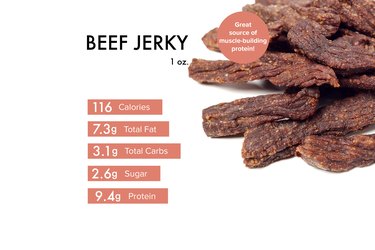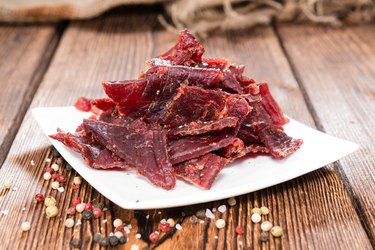
Fun fact: Beef jerky originated as a food preservation technique, as it allows us to store beef for long periods of time and provides a consistent supply of a nutrient-dense, protein-rich and portable food source.
The tasty snack typically made with lean cuts of beef that are sliced into strips and then dehydrated (or dried). Jerky is often prepared using a range of spices and seasonings to add extra flavor.
Video of the Day
Video of the Day
But it also contains a range of essential nutrients, including protein, iron, B vitamins and zinc — deeming jerky both a convenient snack and a great way to help fuel our bodies.
Beef Jerky Nutrition Facts
One ounce of beef jerky, which is about a quarter cup, is equal to a single serving. An ounce of plain beef jerky contains:
- Calories: 116
- Total fat: 7.3 g
- Cholesterol: 13.6 mg
- Sodium: 507 mg
- Total carbs: 3.1 g
- Dietary fiber: 0.5 g
- Sugar: 2.6 g
- Added sugar: 2.6 g
- Protein:
9.4 g
Beef Jerky Macros
- Total fat: A one-ounce serving of beef jerky has 7.3 grams of total fat, which includes 0.3 grams polyunsaturated fat, 3.2 grams monounsaturated fat, 3.1 grams saturated fat and 0 grams trans fat.
- Carbohydrates: A one-ounce serving of beef jerky has 3.1 grams of carbohydrates, which includes 0.5 grams of fiber and 2.6 grams of added sugar.
- Protein: A one-ounce serving of beef jerky has 9.4 grams of protein.
Vitamins, Minerals and Other Micronutrients
- Zinc: 21% of your Daily Value (DV)
- Vitamin B12: 12% DV
- Folate: 10% DV
- Iron: 9% DV
- Phosphorous: 9% DV
- Copper: 7% DV
- Selenium: 6% DV
- Choline: 6%
- Thiamin (B1): 4% DV
- Potassium: 4% DV
- Riboflavin (B2): 3% DV
- Magnesium: 3% DV
- Niacin: 3% DV
- One serving of beef jerky is not a significant source of vitamin E (1% DV), vitamin K (1% DV) or manganese (1% DV).
Health Benefits of Beef Jerky
Like other beef preparations, beef jerky has a rich and varied nutrient profile and contains a wide range of vitamins, minerals and protein.
1. Beef Is Linked to Bolstered Brain Health
Choline is an essential nutrient that is vital for brain health and it's naturally present in some foods, including beef jerky.
Choline is critical during the first two years of life. Higher choline intake by the mother during the third trimester is linked to improved infant processing speed and has lasting beneficial effects on the child's cognitive function, according to the January 2018 issue of the FASEB Journal.
Higher choline intake is also associated with better cognitive performance and increased brain white matter hyper-intensity in older adults, according to the National Institutes of Health (NIH).
And people with Alzheimer's disease have been found to have lower levels of the enzyme that converts choline into acetylcholine in the brain.
2. Beef Jerky Can Help Build and Maintain Muscle
Beef is packed with essential nutrients that can help your body reach peak performance and preserve what you're building. Clocking in with more than nine grams per ounce, beef jerky provides a hefty boost of protein in a small amount of food.
High-quality, protein-rich foods are vital to building, maintain and repairing muscle, which helps optimize the muscle training response both during exercise and afterward, in the recovery period, according to the NIH.
Research has found that a diet rich in high-quality protein in the form of lean red meat is safe and effective for enhancing the effects of resistance training on lean tissue mass and muscle strength in older women, according to a randomized control trial published in the April 2014 issue of the American Journal of Clinical Nutrition.
Enjoying lean cuts of beef in moderation may be a healthy way to increase protein intake, preserve muscle mass and improve overall diet and nutrient quality.
Also integral to muscle metabolism is iron, which helps red blood cells deliver oxygen throughout the body, according to the NIH.
Low levels of iron may lead to iron deficiency or iron deficiency anemia, with symptoms such as fatigue, weakness, gastrointestinal distress, immunity issues and impaired cognitive function.
There are two main forms of iron: non-heme, which comes from iron-fortified foods or plant-based foods and heme, which is found in animal products such as beef. One ounce of beef jerky provides 9 percent of the DV for iron, making it a good way to reach your daily dose.
Tip
Pairing beef with plant-based sources of iron like beans or lentils will help increase your absorption of non-heme iron.
3. Beef Jerky Can Be a Healthy Part of a Weight Management Plan
Feelings of satiety can have a hugely positive effect on weight management. Research has shown that high-quality protein may make you feel more satisfied after a meal, which can help prevent overeating.
A higher protein diet has been shown to improve satiety, appetite control and decreased subsequent food intake, according to a study published in the September 2014 issue of Nutrition Journal.
In addition, a higher protein breakfast specifically showed lasting effects on satiety throughout the day, as shown in a small study published in the February 2013 issue of the American Journal of Clinical Nutrition.
Related Reading
Beef Jerky Health Risks

Food Allergies
Although uncommon, a meat allergy may develop at any time in life, and is sometimes caused by a bite from the Lone Star tick, found predominantly in the Southeastern states, according to the American College of Allergy, Asthma & Immunology.
Speak to an allergist if you suspect you have a meat allergy. Food allergies can cause severe and life-threatening symptoms, and you may need to avoid meat and carry an EpiPen with you.
What's more, beef jerky often contains many additives such as marinades and spices that may be an allergy source.
Drug Interactions
There are no indications of interactions between beef jerky and medications.
Sodium Intake
Store-bought beef jerky typically has a high amount of sodium per one-ounce serving (approximately 500 milligrams). The 2015-2020 Dietary Guidelines recommend that sodium is capped at 2,300 milligrams per day as part of a healthy eating pattern.
Due to jerky's high salt content, moderation is important and for people who need to limit thier sodium (such as those with high blood pressure). Just 5 ounces of jerky exceeds the daily recommendation.
To limit your sodium intake, choose lower-sodium brands or follow our step-by-step instructions on how to make your own, below.
Best Beef Jerky Brands to Buy
Beef Jerky Preparation and Useful Tips
Beef jerky is available nationwide in a range of flavors. Keep store-bought jerky in its original container until ready to eat and homemade jerky in a resealable bag or airtight container, both at room temperature.
If unopened, beef jerky should last up to one year while properly stored opened jerky can last one to two months.
Jerky is created via dehydrating, or removing moisture so that bacteria and enzymes cannot react with the meat and cause it to spoil. Beef jerky can be made at home fairly easily, both with and without a dehydrator. Try this basic recipe for oven-baked homemade beef jerky.
A Homemade Beef Jerky Recipe
- Thinly slice two pounds lean beef, such as eye or top round. If you place it in the freezer for 20 minutes prior to slicing, it will be easier to cut.
- In a resealable bag, add 1 teaspoon ground black pepper, 1 teaspoon kosher salt and optional other flavorings, such as soy sauce, garlic powder or onion powder.
- Add the sliced beef to the bag and toss until evenly coated. Refrigerate for 30 minutes or overnight.
- Preheat oven to 175 degrees Fahrenheit. Line two large baking sheets with aluminum foil and place wire cooling racks on each.
- Lay out the beef strips on the racks in a single layer. Bake for two hours; then turn beef pieces over and cook two more hours.
Now that you have your beef jerky, here are some quick serving ideas.
- Pair with fruit or vegetables for a snack.
- Add to trail mix or granola bars.
- Add to the batter for cornbread or biscuits.
- Add to tomato pasta sauce.
- Saute with onions, peppers and beans then add some broth and simmer.
- Add to stew or chili.
- Use as a topping for baked potatoes or sweet potatoes.
Alternatives to Beef Jerky
There are many types of jerky available nationwide. Alternative animal proteins include turkey, pork, salmon, alligator, buffalo and venison. You can even try biltong, a zero-sugar South African jerky-like snack.
Vegan plant-based varieties are available as well, which are often made from mushroom, tofu, jackfruit, tempeh, eggplant and seitan.
- My Food Data: “Snacks Beef Jerky”
- The FASEB Journal: “Maternal choline supplementation during the third trimester of pregnancy improves infant information processing speed: a randomized, double-blind, controlled feeding study”
- NIH: “Fact Sheet for Health Professionals: Choline”
- NIH: "Dietary Supplements for Exercise and Athletic Performance”
- American Journal of Clinical Nutrition: “Protein-enriched Diet, With the Use of Lean Red Meat, Combined With Progressive Resistance Training Enhances Lean Tissue Mass and Muscle Strength and Reduces Circulating IL-6 Concentrations in Elderly Women: A Cluster Randomized Controlled Trial”
- NIH: "Fact Sheet for Health Professionals: Iron”
- Nutrition Journal: “Effects of high-protein vs. high- fat snacks on appetite control, satiety, and eating initiation in healthy women”
- American Journal of Clinical Nutrition: “Beneficial Effects of a Higher-Protein Breakfast on the Appetitive, Hormonal, and Neural Signals Controlling Energy Intake Regulation in Overweight/Obese, "Breakfast-Skipping," Late-Adolescent Girls”
- American College of Allergy, Asthma & Immunology: "Meat Allergy"
- MayoClinic.com; Vitamin B12; Dec. 1, 2010
- U.S. Centers for Disease Control and Prevention; Americans Consume Too Much Sodium...; November 2010